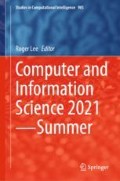Abstract
Methods (functions) are the fundamental components of the software. Programmers usually grasp a method’s behavior by looking at the method’s name. Hence, the name of a method should be a summary of what the method does. There has been a study utilizing Word2Vec, Doc2Vec, and the convolutional neural network (CNN) to evaluate the consistency between a method’s name and body in an automated way. While the conventional evaluation procedure detects inconsistent method names successfully, its CNN-based vectorization model construction requires costly computations. This paper focuses on such a computational cost and proposes to replace it with another lightweight vectorization approach. The comparative study using four alternative approaches proved that the Sent2Vec, one of the alternatives, can build the vectorization model 14 times faster than the conventional one while maintaining the capability of detecting inconsistent method names.
Access this chapter
Tax calculation will be finalised at checkout
Purchases are for personal use only
Notes
- 1.
- 2.
CPU: Intel Core i5-6600 3.3GHz; Memory: 16GB; OS: Linux 4.19.128.
- 3.
References
Liblit, B., Begel, A., Sweetser, E.: Cognitive perspectives on the role of naming in computer programs. In: Proceedings of 18th Annual Psychology of Programming Workshop, pp. 53–67 (2006)
Martin, R.C.: Clean Code: A Handbook of Agile Software Craftsmanship. Prentice Hall, Boston (2008)
Deissenboeck, F., Pizka, M.: Concise and consistent naming. Softw. Quality J. 14(3), 261–282 (2006)
Boswell, D., Foucher, T.: The Art of Readable Code: Simple and Practical Techniques for Writing Better Code. Oreilly & Associates, Sebastopol, CA (2011)
Gosling, J., Joy, B., Steele Jr., G.L., Bracha, G., Buckley, A.: The Java Language Specification. Addison-Wesley, Boston, MA (2014)
Montgomery, S.L. (ed.): MISRA C: Guidelines for the Use of the C Language in Critical Systems 2012. Motor Industry Research Association, Warwickshire (2013)
Kernighan, B.W., Pike, R.: The Practice of Programming. Addison-Wesley Longman, Boston, MA (1999)
Free Software Foundation: GNU Coding Standards. https://www.gnu.org/prep/standards/. Accessed 20 Nov 2020
Allamanis, M., Barr, E.T., Bird, C., Sutton, C.: Learning natural coding conventions. In: Proceedings of 22nd ACM SIGSOFT International Symposium on Foundations of Software Engineering, pp. 281–293 (2014)
Liu, K., Kim, D., Bissyandé, T.F., Kim, T., Kim, K., Koyuncu, A., Kim, S., Traon, Y.L.: Learning to spot and refactor inconsistent method names. In: Proceedings of 41st International Conference on Software Engineering, pp. 1–12 (2019)
Mikolov, T., Sutskever, I., Chen, K., Corrado, G.S., Dean, J.: Distributed representations of words and phrases and their compositionality. Adv. Neural Inf. Process. Syst. 26, 3111–3119 (2013)
Le, Q., Mikolov, T.: Distributed representations of sentences and documents. In: Proceedings of 31st International Conference on Machine Learning, vol. 32(2), pp. 1188–1196 (2014)
Goodfellow, I., Bengio, Y., Courville, A.: Deep Learning. MIT Press, MA (2016)
Liu, K.: Debug-Method-Name. https://github.com/SerVal-DTF/debug-method-name/tree/master/Data. Accessed 20 Dec 2020
Pagliardini, M., Gupta, P., Jaggi, M.: Unsupervised learning of sentence embeddings using compositional n-gram features. In: Proceedings of 2018 Conference on North American Chapter of the Association for Computational Linguistics: Human Language Technologies, vol. 1, pp. 528–540 (2018)
Høst, E.W., Østvold, B.M.: Debugging method names. In: Drossopoulou, S. (ed.) ECOOP 2009—Object-Oriented Programming. Lecture Notes in Computer Science, vol. 5653, pp. 294–317. Springer, Berlin, Heidelberg (2009)
Runeson, P., Alexandersson, M., Nyholm, O.: Detection of duplicate defect reports using natural language processing. In: Proceedings of 29th International Conference on Software Engineering, pp. 499–510 (2007)
Lawrie, D., Feild, H., Binkley, D.: Extracting meaning from abbreviated identifiers. In: Proceedings of 7th IEEE International Working Conference on Source Code Analysis & Manipulation, pp. 213–222 (2007)
Hill, E., Fry, Z.P., Boyd, H., Sridhara, G., Novikova, Y., Pollock, L., Vijay-Shanker, K.: AMAP: automatically mining abbreviation expansions in programs to enhance software maintenance tools. In: Proceedings of 2008 International Working Conference Mining Software Repositories, pp. 79–88 (2008)
Corazza, A., Martino, S.D. , Maggio, V.: Linsen: an efficient approach to split identifiers and expand abbreviations. In: Proceedings of 28th IEEE International Conference on Software Maintenance, pp. 233–242 (2012)
Alatawi, A., Xu, W., Yan, J.: The expansion of source code abbreviations using a language model. In: Proceedings of 2018 IEEE 42nd Annual Computer Software & Applications Conference, vol. 2, pp. 370–375 (2018)
Sauer, C., Jeffery, D.R., Land, L., Yetton, P.: The effectiveness of software development technical reviews: a behaviorally motivated program of research. IEEE Trans. Softw. Eng. 26(1), 1–14 (2000)
Rigby, P., Cleary, B., Painchaud, F., Storey, M.-A., German, D.: Contemporary peer review in action: lessons from open source development. IEEE Softw. 29(6), 56–61 (2012)
Bojanowski, P., Grave, E., Joulin, A., Mikolov, T.: Enriching word vectors with subword information. Trans. Assoc. Comput. Linguist. 5, 135–146 (2017)
Devlin, J., Chang, M.-W. , Lee, K., Toutanova, K.: BERT: pre-training of deep bidirectional transformers for language understanding. In: Proceedings of 2019 Conference on North American Chapter of the Association for Computational Linguistics: Human Language Technologies, vol. 1, pp. 4171–4186. Association for Computational Linguistics, Minneapolis, Minnesota (2019)
Acknowledgements
The authors would like to thank the anonymous reviewers for their helpful comments on an earlier version of this paper. This work was supported by JSPS KAKENHI Grant #20H04184, #21K11831, and #21K11833.
Author information
Authors and Affiliations
Corresponding author
Editor information
Editors and Affiliations
Rights and permissions
Copyright information
© 2021 The Author(s), under exclusive license to Springer Nature Switzerland AG
About this chapter
Cite this chapter
Minehisa, T., Aman, H., Yokogawa, T., Kawahara, M. (2021). A Comparative Study of Vectorization Approaches for Detecting Inconsistent Method Names. In: Lee, R. (eds) Computer and Information Science 2021—Summer . ICIS 2021. Studies in Computational Intelligence, vol 985. Springer, Cham. https://doi.org/10.1007/978-3-030-79474-3_9
Download citation
DOI: https://doi.org/10.1007/978-3-030-79474-3_9
Published:
Publisher Name: Springer, Cham
Print ISBN: 978-3-030-79473-6
Online ISBN: 978-3-030-79474-3
eBook Packages: Intelligent Technologies and RoboticsIntelligent Technologies and Robotics (R0)

